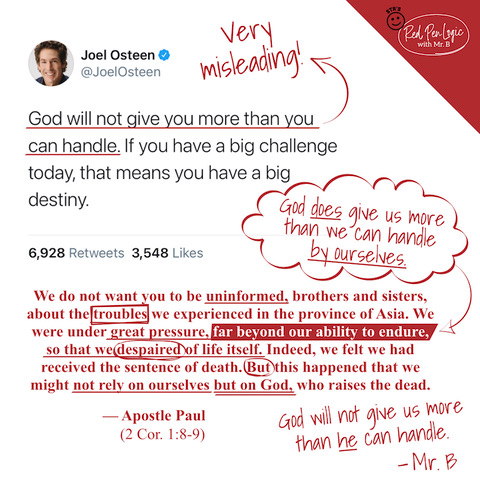
In today’s tweet, Joel Osteen offers a familiar slogan. He says, “God will not give you more than you can handle. If you have a big challenge today, that means you have a big destiny.”
First, Osteen’s catchphrase creates confusion. It sounds like God won’t let terrible circumstances befall you. But that’s not true. God never promises we will escape the difficulties of life. Jesus promises just the opposite—tribulation.
Second, even though our circumstances may feel overwhelming, God is still good. Because he has not left us, we can rely on him. In fact, he has promised to work all things together for good for those called according to his purpose.
Third, some might be thinking, what about 1 Corinthians 10:13? Two quick thoughts: First, this second passage is about temptations, not trials. When we look at the context, Paul warns the church not to fall for the same temptations the Israelites fell for. They engaged in idolatry (v. 7), sexual immorality (v. 8), and grumbling (v. 10).
Paul’s point in 1 Corinthians 10 is clear. We experience temptation just like the Israelites did. But with every temptation, God faithfully provides a way of escape from the temptation so we’ll able to endure it. In other words, God has given us the ability to beat the temptation with the help of the Spirit.
Transcript
You’ve probably heard someone say it: “God will not give you more than you can handle.” It’s meant to bring comfort. But to those who have really suffered, it just brings pain. Is it true that God will not give you more than you can handle? Let’s find out.
This is Red Pen Logic with Mr. B, where we help you assess bad thinking by using good thinking. Plus, we try to have some fun while we’re doing it. In today’s tweet, the famous Joel Osteen offers a familiar Christian slogan. He says, “God will not give you more than you can handle. If you have a big challenge today, that means you have a big destiny.” I think people need to stop saying this, and I want to tell you why.
This mantra is well-meaning, but it’s terribly misleading. Here’s how. It sounds like God will protect me from all the difficulties of life. God won’t let me lose a child, he won’t let me get terminal cancer, he won’t let me suffer from mental illness, because that would be more than I can handle. Can you see how this slogan sets up unrealistic expectations?
When I was a young Christian, I thought that God wouldn’t let anything really bad happen to me. So, in high school, when I found out my grandma had just died, I was devastated. Didn’t God realize he was breaking his promise? After all, this was more than I could handle.
My story isn’t unique. Many have been crushed under the weight of intense suffering. Experiencing the loss of a child, facing a terminal diagnosis, being sexually abused, and on, and on, and on. Isn’t it obvious that any of these would qualify as more than our ability to handle?
Here’s the problem: If you are suffering beyond what you can handle, whose fault is it? If it’s true that God hasn’t given you more than you can handle, and you’re not handling it very well, then it’s on you for not handling it better. Do you see the problem? This well-meaning mantra turns into a cruel catchphrase.
Sometimes God does allow us to experience terrible things that’s more than we can handle by ourselves. That qualification is really important. The apostle Paul knew a thing or two about being overwhelmed by the troubles of life. “We do not want you to be uninformed, brothers and sisters, about the troubles we experienced in the province of Asia. We were under great pressure, far beyond our ability to endure, so that we despaired of life itself. Indeed, we felt that we had received a sentence of death. But this happened that we might not rely on ourselves but on God, who raises the dead.”
Paul wants us to be aware of the harsh realities that he experienced. In fact, he admits it was far beyond his ability to endure. In other words, it was more than he could handle. But Paul tells us why God gave him more than he could handle. It was so that he would rely on God, not himself.
What Paul experienced was more than he could handle, but it wasn’t more than what God can handle. Even a sentence of death wouldn’t stop God because God can raise the dead. Get it? Like Paul, you and I are going to experience more than we can handle by ourselves. That’s why we must rely on God because God can handle anything we face in this life.
Despite what Osteen says, “God will not give you more than you can handle” is not a promise from God. Actually, God promises just the opposite. Jesus said, “In this world you will face tribulation. But take heart; I have overcome the world.” Who? Jesus. Many of us will not escape tribulations that seem unbearable, but God can use them for our good. Romans 8 says that we know that God causes all things—even those things that are more than we can handle on our own—to work together for our good.
Now, some of you are thinking, “What about 1 Corinthians 10:13?” Well, I’m glad you asked. “No temptation has overtaken you that is not common to man. God is faithful, and he will not let you be tempted beyond your ability, but with the temptation he will also provide a way of escape, that you may be able to endure it.” In the first passage we looked at, Paul says his troubles were far beyond his ability to endure. But in this passage, Paul says that God will not allow you to be tempted beyond your ability to endure. So which is it?
Two quick thoughts. First, this second passage is about temptations, not trials. When we look at the context (never read a Bible verse), Paul warns the church not to fall for the same temptations that the Israelites fell for. They engaged in idolatry (verse 7), sexual immorality (verse 9), and grumbling (verse 10).
Paul’s point in 1 Corinthians 10 is clear. We experience temptations just like the Israelites did. But with every temptation, God faithfully provides a way of escape from the temptation so we’re able to endure it. In other words, God has given us the ability to beat the temptation with the help of the Spirit.
So, what have we learned? First, Osteen’s catchphrase creates confusion. (You like that alliteration?) It sounds like God won’t let really bad things happen to you, but that’s not true. God never promises that we’re going to escape the difficulties of life. In fact, Jesus promised just the opposite.
Second, even though our circumstances may feel overwhelming, God is still good. Because he has not left us, we can rely on him. In fact, he’s promised to work all things together for good for those who are called according to his purpose.
Third, when we are tempted to sin, God has promised a way of escape so that we don’t have to fall. God may give you more than you can handle by yourself, but God will never give you more than he can handle. Class dismissed.

